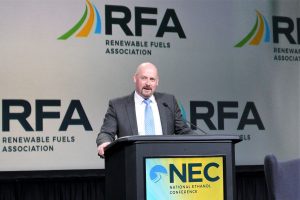The head of the Renewable Fuels Association slammed a report from the General Accounting Office on small refinery waivers (SREs) released this week that was requested over three years ago as both flawed and obsolete.
 “You simply can’t make this stuff up,” said RFA President and CEO Geoff Cooper. “In the summer of 2019, a bipartisan group of renewable fuel supporters in both the House and Senate asked the GAO to investigate the gross mismanagement of the small refinery exemption program by former EPA Administrators Scott Pruitt and Andy Wheeler. Now, more than three years later—and less than one week before the mid-term elections—GAO puts out a shoddy report that is friendly to oil refiners and purports to answer questions no one ever asked.”
“You simply can’t make this stuff up,” said RFA President and CEO Geoff Cooper. “In the summer of 2019, a bipartisan group of renewable fuel supporters in both the House and Senate asked the GAO to investigate the gross mismanagement of the small refinery exemption program by former EPA Administrators Scott Pruitt and Andy Wheeler. Now, more than three years later—and less than one week before the mid-term elections—GAO puts out a shoddy report that is friendly to oil refiners and purports to answer questions no one ever asked.”
The GAO report found, “The U.S. Environmental Protection Agency (EPA) does not have assurance that its decisions about small refinery exemptions under the Renewable Fuel Standard (RFS) are based on valid information. In addition, EPA and the Department of Energy (DOE) do not have policies and procedures specifying how they are to consult about and make exemption decisions.”
The report claims EPA’s conclusion that small refineries do not experience disproportionate economic hardship from the RFS “relies on a potentially flawed assumption—that all parties pay and receive one price for the tradeable credits used to demonstrate compliance with the RFS. GAO found that EPA has not analyzed whether this assumption is valid.”
Cooper argues, “The bottom line is there is no such thing as ‘disproportionate economic hardship’ under the RFS. All refiners—large or small, merchant or integrated—face the same compliance obligations and they all pass their RIN costs on to fuel blenders at the terminal. Period. There is a mountain of evidence confirming this fact, and GAO’s new report will just be thrown on the growing scrap heap of refiner disinformation meant to undermine the success of the RFS.”
Cooper said the only thing GAO got right in its report was the fact that SREs reduce demand for renewable fuel, causing harm to ethanol producers.

